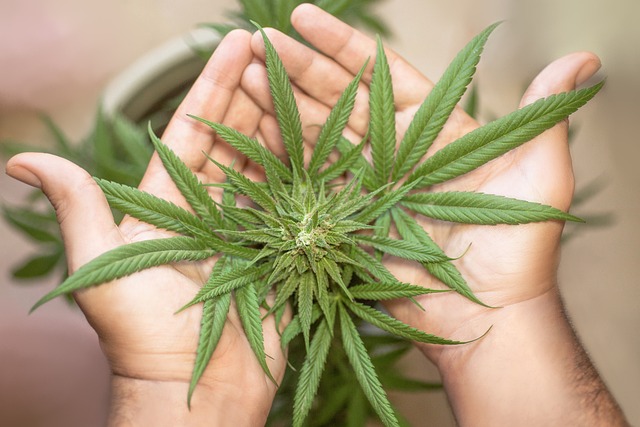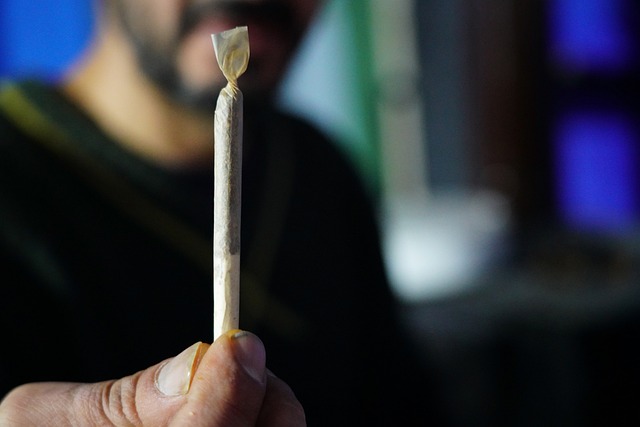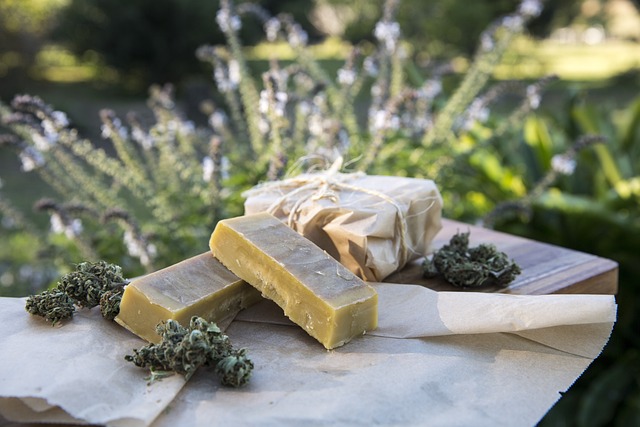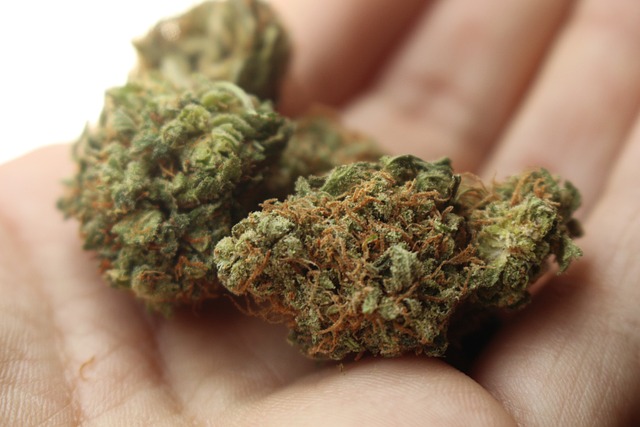2023 has seen significant interest in THCA (Tetrahydrocannabinolic Acid), a non-psychoactive cannabinoid found in the cannabis plant, particularly within legal jurisdictions across the USA. As an alternative to THC with potential health benefits and no psychoactive effects, THCA has become increasingly popular among consumers in states where cannabis use is sanctioned for medical or recreational purposes. Available in various forms, including flowers, oils, and topicals, THCA products are under scientific scrutiny for their therapeutic properties, such as anti-inflammatory, neuroprotective, and potential anti-cancer effects. The legality of these products is state-specific within the USA, with some states legalizing THCA while others maintain different regulations. This dynamic legal landscape requires informed consumer choices to navigate the evolving cannabis market. As awareness grows, THCA's role in complementary and alternative medicine is gaining prominence, offering a versatile option for individuals sensitive to or opting out of psychoactive substances. Consumers interested in THCA must stay updated on their state's regulations to ensure compliance with the law as they explore this promising alternative within the cannabis industry.
THC acid (THCA) is a non-psychoactive compound found in cannabis that’s gaining attention for its potential wellness benefits and legality across various U.S. states. As interest grows in the therapeutic properties of cannabinoids, THCA emerges as a key player, offering a legal high with promising effects on inflammation, neuroprotection, pain management, mood enhancement, stress relief, and sleep patterns. This article delves into the burgeoning landscape of THCA flower benefits, its interaction with the endocannabinoid system, and the legalities surrounding its use in the United States. From understanding its legality and availability to exploring the entourage effect with other cannabinoids, readers will gain insight into how THCA could become an integral part of holistic health practices. Join us as we explore the science, benefits, and future potential of THCA legal in USA states.
- Unlocking the Potential of THCA Flower: A Legal High in USA States
- The Rise of THCA: Understanding Its Legality and Availability Across the U.S.
- THCA Flower Benefits: An Overview of Therapeutic Properties
- THCA vs. Delta-9 THC: A Comprehensive Comparison
Unlocking the Potential of THCA Flower: A Legal High in USA States

In recent years, the cannabis industry has seen a surge in interest surrounding THCA (Tetrahydrocannabinolic Acid), a non-psychoactive precursor to the more well-known THC (Tetrahydrocannabinol). As of my knowledge cutoff in 2023, THCA is legally available in many states across the USA, where cannabis has been legalized for medical or recreational use. This legality opens up a world of potential for consumers looking to explore its benefits without the psychoactive effects typically associated with THC-rich products. THCA flower, which contains high levels of THCA and low levels of THC, is particularly appealing as it allows users to partake in the legal cannabis market without experiencing a ‘high’ if that is their preference. The benefits of THCA are numerous and include its anti-inflammatory, neuroprotective, and potentially anti-cancer properties, making it a subject of ongoing scientific research. Users report that THCA can provide relief from pain and inflammation without the intoxicating effects, making it a versatile choice for those sensitive to or preferring not to be impaired. As awareness grows and research continues to unveil THCA’s therapeutic potential, its role in complementary and alternative medicine becomes increasingly significant.
For those residing in states where cannabis has been legalized, exploring the benefits of THCA flower is an exciting frontier. The legality of THCA in these regions allows for a broader range of products and consumption methods, from smokable flowers to concentrated oils and topicals. As the market evolves, consumers are provided with more choices tailored to their wellness needs, whether they seek the potential therapeutic effects of cannabinoids or simply wish to enjoy the legal status of these products within the context of their state laws. It’s important for potential users to stay informed about the specific regulations and restrictions in their respective states, ensuring compliance with local laws while exploring the diverse offerings of the THCA market.
The Rise of THCA: Understanding Its Legality and Availability Across the U.S.

2023 has seen a notable surge in interest and research surrounding THCA, or tetrahydrocannabinolic acid, a non-psychoactive compound found in raw cannabis that is being recognized for its potential therapeutic benefits. As states across the U.S. continue to refine their cannabis laws, the legality of THCA has become increasingly nuanced. In some U.S. states where cannabis has been legalized, THCA products are gaining traction due to their reported health advantages and the absence of psychoactive effects associated with THC. Consumers are exploring these products as a means to harness the wellness benefits of cannabinoids without the high. The legality of THCA-rich products is tied to the specific laws within each state, with some permitting the sale and possession of THCA flowers and derivatives, while others remain more restrictive. It’s crucial for consumers to be well-versed in their state’s regulations regarding cannabinoids to navigate this evolving market responsibly. As of early 2023, a growing number of dispensaries across legal states offer THCA products, reflecting the changing landscape and consumer preferences. The availability of these products is indicative of a shifting paradigm in how society perceives and utilizes cannabinoids for well-being and health support.
THCA Flower Benefits: An Overview of Therapeutic Properties

Cannabidiolic acid (THCA) is a non-psychoactive compound found in the cannabis plant that has garnered attention for its potential therapeutic properties. As of my knowledge cutoff in 2023, THCA is legal in various states across the USA under specific regulations that differentiate it from its psychoactive counterpart, delta-9-tetrahydrocannabinol (THC). This legality has opened doors for research and exploration into the benefits of THCA. Studies suggest that THCA may offer a range of wellness effects, including anti-inflammatory, neuroprotective, and analgesic properties without the psychoactive “high” associated with its decarboxylated form, THC. This makes THCA an attractive option for individuals seeking the potential health benefits of cannabis without mind-altering effects.
The therapeutic benefits of THCA are primarily attributed to its interaction with the body’s endocannabinoid system, which plays a role in regulating pain, inflammation, and immune system responses. Preliminary research indicates that THCA may help alleviate symptoms related to conditions such as arthritis and neuropathic pain due to its anti-inflammatory properties. Additionally, it has shown promise in neuroprotective applications, potentially aiding in the management of neurological disorders like epilepsy. As the legal landscape continues to evolve, allowing for more comprehensive studies on THCA, the full extent of its benefits may become better understood, further contributing to its role in holistic health practices.
THCA vs. Delta-9 THC: A Comprehensive Comparison

Delta-9 tetrahydrocannabinol (Delta-9 THC) and tetrahydrocannabinolic acid A (THCA) are both prominent cannabinoids found in the Cannabis sativa plant, each offering distinct effects and wellness applications. While Delta-9 THC is the psychoactive component that is responsible for the ‘high’ associated with cannabis use and is legal in various states across the USA under specific regulations, THCA is its non-psychoactive precursor.
THCA is gaining attention for its potential health benefits, which include anti-inflammatory and neuroprotective properties. It’s worth noting that THCA is present in raw cannabis plants or those prepared using methods that preserve the acidic form of cannabinoids. As such, understanding the legal status of THCA-rich products is crucial for consumers navigating the evolving landscape of cannabis legality in the USA. In states where Delta-9 THC is legal, THCA may also be permissible, though its legal status can vary based on local laws and regulations. Consumers interested in the potential benefits of THCA should first verify its legality within their jurisdiction before use. THCA’s growing popularity stems from anecdotal reports and scientific studies suggesting it may offer therapeutic effects without the psychoactive ‘high’ associated with Delta-9 THC, making it a compelling option for individuals seeking the health benefits of cannabinoids in settings where psychotropic effects are not desired or are restricted by law.
2023 has been a landmark year for the therapeutic cannabinoid THCA, with its legal status in various U.S. states paving the way for a new frontier in alternative medicine and wellness. The benefits of THCA flower, a non-psychoactive precursor to Delta-9 THC, have garnered attention due to its potential therapeutic properties, which are distinct from those of traditional THC products. As the understanding of THCA’s legal standing and accessibility expands, it becomes increasingly clear that this compound holds significant promise for those seeking natural relief for various conditions. This article has shed light on the multifaceted nature of THCA flower, highlighting its unique position within the legal landscape of the USA and its burgeoning role in health and wellness. With continued research and legislative progress, THCA’s potential to offer a host of benefits, both therapeutic and recreational where legal, is poised to be fully realized.
